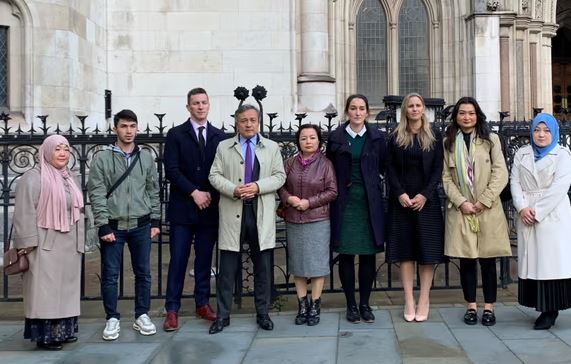Lawyers and representatives from the World Uyghur Congress and the Uyghur community in 2022. The court’s judgment means the NCA will have to reconsider its decision not to investigate. Photograph: Tom Pilgrim/PA
Istanbul, Turkistan Times – July 24, 2025 – A report published by the UK Parliament's Joint Committee on Human Rights has presented strong evidence that goods produced through state-sponsored, large-scale forced labour in China's East Turkistan (referred to as Xinjiang in the report) are entering the UK market. The report strongly criticized the UK government's existing legislation as insufficient to address the issue, and noted that the UK is lagging far behind its international partners, such as the United States and the European Union.
The report, titled "Forced labour in UK supply chains," specifically highlighted China's forced labour policies targeting Uyghurs and other indigenous peoples. According to the report, one in five cotton garments worldwide is believed to be linked to forced labour in the East Turkistan region. In her testimony to the committee, Rahima Mahmut, UK Director of the World Uyghur Congress, stated that Uyghurs are facing discriminatory forced labour and transfer policies, as well as the separation of families.
The report also gave special attention to the risks within the solar panel industry. It pointed out that a significant portion of the polysilicon required for the production of these panels is processed in regions with a high risk of forced labour, primarily in China. Consequently, it is impossible to know if solar panels sold in the UK are free from forced labour. This situation persists despite the UK government having recognized China's repressive policies in East Turkistan as "genocide" in 2021.
In response to these issues, the committee recommended a series of urgent and wide-ranging measures for the UK government. The report proposed that within one year, the government should introduce new legislation to make it illegal to import and sell goods linked to forced labour and to impose mandatory human rights due diligence on companies. It also called for the implementation of an import ban on goods from places with state-sponsored forced labour, such as China's East Turkistan region, incorporating a "rebuttable presumption" principle similar to the US "Uyghur Forced Labor Prevention Act." This principle places the burden of proof on the importer to demonstrate that the products were not made with forced labour. Furthermore, concrete measures were suggested, including banning forced labour products from government procurement, using powers under the Proceeds of Crime Act to hold those profiting from forced labour accountable, and facilitating victims' ability to bring legal action against companies in UK courts.
The report specifically emphasized that the US and the EU have already implemented strict legal measures in this area, and the UK's current inaction creates a risk of it becoming a "dumping ground" for products of forced labour.
Following the report's publication, the UK government is expected to respond to these recommendations within two months. The international community, especially Uyghur human rights organizations, will be closely watching to see whether the UK government takes concrete and effective action this time.
https://publications.parliament.uk/pa/jt5901/jtselect/jtrights/633/report.html

